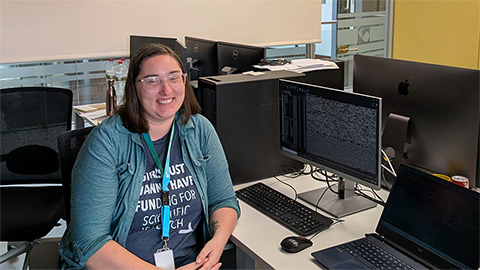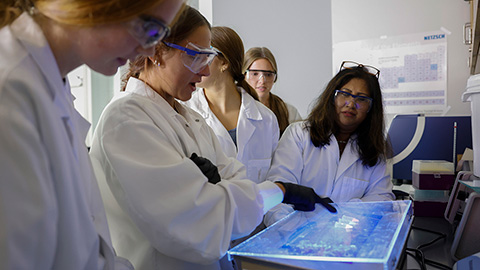Imposter syndrome: beating the blue-eyed monster
I think it’s all too good to be true.
I have a Ph.D., scientific publications, interesting projects and awards for my scientific work. On the side, I have a successful career as a science writer and awards for that too. People tell me I’m smart and successful and that I’ll be great some day. And I don’t believe any of it. Why? Because I, like a lot of other scientists, have imposter syndrome.

Imposter syndrome is a psychological phenomenon that makes people unable to feel or internalize their own accomplishments. People with imposter syndrome, who often are mistaken for being exceedingly humble, can’t believe they are as awesome as they really are, even though there is often very good evidence of their merits.
Imposter syndrome takes different forms. Sometimes you think the good stuff that happens to you is just luck. Sometimes you think people are just giving you accolades because they pity you or because they don’t know that someone so much better is out there.
No matter what, it results in a feeling that you don’t deserve what you have – your tenure-track job, your really good publications, your grant – and that the instant people realize or find you out, they’re going to take it all away.
Oh, that award? They must not know what they’re doing! If they knew what they were doing, they’d know I could never deserve it.
This job? I can’t do this job! Who am I kidding? Soon they’re going to realize I’m totally incompetent!
I like to call this phenomenon the blue-eyed monster. While jealousy is usually called the green-eyed monster, to my mind the blue-eyed monster is the one that colors everything a sad, unbelieving blue. All your bright accomplishments, constantly compared to the accomplishments of others, look duller. The blue-eyed monster is the one that stares out at the world unable to believe that anything is really as good as it is.
Imposter syndrome disproportionately affects women and minorities in science, preventing them from applying for awards, grants or raises, or from sending their papers to those high-impact journals.
After all, why try for it? You know you won’t get it. If you did, well, it’d just be luck, right?
Wrong. Sometimes, you are a really good scientist. You really do great work. You have great ideas and are a great teacher. You really are a qualified candidate for that award, that grant, that raise and that job. But you won’t get them if you don’t apply. And, in order to apply, you need to battle back imposter syndrome. But how? How do we stop ourselves from denigrating our work? How do we internalize our own accomplishments?
Here's what I recommend:
1. Go to your biggest fans. Trusting relationships with mentors can provide a lot of support. Good mentors have seen your successes and your struggles from the outside, and they know the successes for the great things that they are. When you see a grant or an award and think that it might fit but you couldn’t possibly qualify, stop yourself. Ask your mentors. You might find that they are sure you qualify and that you should apply. I know that I would not have applied for any of the awards I have won had it not been for the support of my mentors, who, when I asked them, said I absolutely fit the criteria. If you have colleagues and friends who are relatively close to your work, they also can provide outside perspectives and much-needed encouragement. Share your doubts with people you trust.
2. Remind yourself of what you have done. When you’re about to tell yourself that you can’t do something, take a moment to look at something you are proud of. Have your degree(s) up on the wall. Update your CV. If you have them, read some nice letters of reference or support in which your mentors made you blush with their fulsome praise. Look at your work. See what you’ve accomplished. The more that you look at the positive messages, the harder they become to ignore. You’ve done a lot before. You can do more now. You can do this.
3. Think like a scientist. We scientists are pretty logically minded. Many of us pride ourselves on seeing the world for what it is and focusing on the facts. Well, focus on the facts! Especially when you evaluate your own work. Look at where you’ve published and at the other papers published there. They are pretty good! Look at the editorial board. Often it is full of well-established scientists: They can’t be fools. Look at your citation index: Other people are reading and citing your work. The evidence is clear: You’re pretty good!
4. Recognize that you are not alone. Because you’re not. Imposter syndrome is incredibly widespread and very rarely talked about. Many of the people who look like they have it all together suffer from many of the same doubts that you and I have. And we can’t all be incompetent!
Some people might say that imposter syndrome is just nonsense or that it’s just another term for insecurity. It may very well be a type of insecurity, but it is certainly not nonsense when it prevents you from applying to jobs or for grants or submitting papers to the top-tier journals. When imposter syndrome is dragging down your career, it should not be dismissed.
Imposter syndrome, once recognized, can be fought. You don’t have to let your doubts hinder you. By tapping your trusted mentors, colleagues and friends, by acknowledging all that you have done and by recognizing that doubt is difficult for all of us, you can fight it, and you can win. Sometimes, it’s not luck or being an imposter. Sometimes, you really are that good.
Imposter syndrome still gets me down, especially in the face of rejection or in times of doubt or uncertainty. Unfortunately, those times are often the ones when you need to pick yourself up and move on the most. But talking with my mentors and friends has helped me to focus on the facts: I work very hard, and I need to be confident in what I do. I can’t look at my career and let the blue-eyed monster dim my accomplishments. I have to see my work for what it is and use the confidence in myself to reach for the stars. And no blue-eyed monster is going to stop me.
Enjoy reading ASBMB Today?
Become a member to receive the print edition four times a year and the digital edition monthly.
Learn moreGet the latest from ASBMB Today
Enter your email address, and we’ll send you a weekly email with recent articles, interviews and more.
Latest in Opinions
Opinions highlights or most popular articles

Making my spicy brain work for me
Researcher Reid Blanchett reflects on her journey navigating mental health struggles through graduate school. She found a new path in bioinformatics, proving that science can be flexible, forgiving and full of second chances.

The tortoise wins: How slowing down saved my Ph.D.
Graduate student Amy Bounds reflects on how slowing down in the lab not only improved her relationship with work but also made her a more productive scientist.

How pediatric cataracts shaped my scientific journey
Undergraduate student Grace Jones shares how she transformed her childhood cataract diagnosis into a scientific purpose. She explores how biochemistry can bring a clearer vision to others, and how personal history can shape discovery.

Debugging my code and teaching with ChatGPT
AI tools like ChatGPT have changed the way an assistant professor teaches and does research. But, he asserts that real growth still comes from struggle, and educators must help students use AI wisely — as scaffolds, not shortcuts.

AI in the lab: The power of smarter questions
An assistant professor discusses AI's evolution from a buzzword to a trusted research partner. It helps streamline reviews, troubleshoot code, save time and spark ideas, but its success relies on combining AI with expertise and critical thinking.

How AlphaFold transformed my classroom into a research lab
A high school science teacher reflects on how AI-integrated technologies help her students ponder realistic research questions with hands-on learning.

